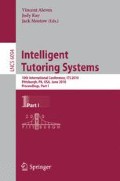Abstract
Many tutoring systems allow students to ask for hints when they need help solving problems, and this has been shown to be helpful. However, many students have trouble knowing when to ask for help or they prefer to guess rather than ask for and read a hint. Is it better to give a hint when a student makes an error or wait until the student asks for a hint? This paper describes a study that compares giving hints proactively when students make errors to requiring students to ask for a hint when they want one. We found that students learned reliably more with hints-on-demand than proactive hints. This effect was especially evident for students who tend to ask for a high number of hints. There was not a significant difference between the two conditions for students who did not ask for many hints.
Access this chapter
Tax calculation will be finalised at checkout
Purchases are for personal use only
Preview
Unable to display preview. Download preview PDF.
References
Anderson, J.R.: Rules of the Mind. Erlbaum, Hillsdale (1993)
Burton, R.R., Brown, J.S.: An Investigation of Computer Coaching for Informal Learning Activities. In: Sleeman, D.H., Brown, J.S. (eds.) Intelligent Tutoring Systems. Academic Press, New York (1982)
Kay, J.: Learner Control. User Modeling and User-Adapted Interaction 11, 111–127 (2001)
Beck, J.: Does Learner Control Affect Learning? In: 13th International Conference on Artificial Intelligence in Education, pp. 135–142 (2007)
Wood, D.: Scaffolding, contingent tutoring, and computer-supported learning. International Journal of Artificial Intelligence in Education 12, 280–292 (2001)
Renkl, A.: Learning from worked-out examples: Instructional explanations supplement self-explanations. Learning & Instruction 12, 529–556 (2002)
Schworm, S., Renkl, A.: Learning by solved example problems: Instructional explanations reduce self-explanation activity. In: Gray, W.D., Schunn, C.D. (eds.) 24th Annual Conference of the Cognitive Science Society, pp. 816–821. Erlbaum, Mahwah (2002)
Arroyo, I., Murrary, T., Woolf, B.P.: Inferring Unobservable Learning Variables From Students’ Help Seeking Behavior. In: Lester, J.C., Vicari, R.M., Paraguaçu, F. (eds.) ITS 2004. LNCS, vol. 3220, pp. 782–784. Springer, Heidelberg (2004)
Nelson-Le Gall, S.: Help-seeking: An understudied problem-solving skill in children. Developmental Review 1, 224–246 (1981)
Baker, R., Walonoski, J., Heffernan, N., Roll, I., Corbett, A., Koedinger, K.: Why Students Engage in “Gaming the System” Behavior in Interactive Learning Environments. J. Interactive Learning Research 19(2), 185–224 (2008)
Aleven, V., Koedinger, K.: Limitations of student control: Do students know when they need help? In: Gauthier, G., VanLehn, K., Frasson, C. (eds.) ITS 2000. LNCS, vol. 1839, pp. 292–303. Springer, Heidelberg (2000)
Aleven, V., McLaren, B., Roll, I., Koedinger, K.: Toward tutoring help seeking: Applying cognitive modeling to meta-cognitive skills. In: Lester, J.C., Vicari, R.M., Paraguaçu, F. (eds.) ITS 2004. LNCS, vol. 3220, pp. 227–239. Springer, Heidelberg (2004)
Arroyo, I., Beck, J.E., Beal, C.R., Wing, R., Woolf, B.P.: Analyzing students’ response to help provision in an elementary mathematics intelligent tutoring system. In: Luckin, R. (ed.) Papers of the AIED 2001 Workshop on Help Provision and Help Seeking in Interactive Learning Environments, San Antonio, Texas, pp. 34–46 (2001)
Murray, C., VanLehn, K.: A Comparison of Decision-Theoretic, Fixed-Policy and Random Tutorial Action Selection. In: Ikeda, M., Ashley, K.D., Chan, T.-W. (eds.) ITS 2006. LNCS, vol. 4053, pp. 114–123. Springer, Heidelberg (2006)
Razzaq, L., Heffernan, N.T., Koedinger, K.R., Feng, M., et al.: Blending Assessment and Instructional Assistance. In: Nedjah, N., de Macedo, M.L., Borges, M.N., Almeida, N.N. (eds.) Intelligent Educational Machines within the Intelligent Systems Engineering Book Series, pp. 23–49 (2007)
Author information
Authors and Affiliations
Editor information
Editors and Affiliations
Rights and permissions
Copyright information
© 2010 Springer-Verlag Berlin Heidelberg
About this paper
Cite this paper
Razzaq, L., Heffernan, N.T. (2010). Hints: Is It Better to Give or Wait to Be Asked?. In: Aleven, V., Kay, J., Mostow, J. (eds) Intelligent Tutoring Systems. ITS 2010. Lecture Notes in Computer Science, vol 6094. Springer, Berlin, Heidelberg. https://doi.org/10.1007/978-3-642-13388-6_39
Download citation
DOI: https://doi.org/10.1007/978-3-642-13388-6_39
Publisher Name: Springer, Berlin, Heidelberg
Print ISBN: 978-3-642-13387-9
Online ISBN: 978-3-642-13388-6
eBook Packages: Computer ScienceComputer Science (R0)

